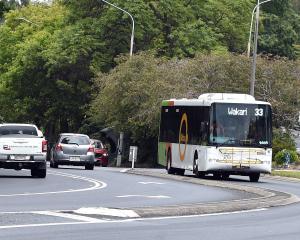
Prof Lord, of the University of Otago botany department, commented yesterday in an 11am campus talk titled ''One billion trees for carbon sequestration''.
''The most critical conversation we need to have, at a national level, is what do we want this country to look like in 100 years' time, as we are planting for our children and their children after them,'' Prof Lord added in an interview.
''The afforestation decisions we make today will affect our landscape for generations, so should not be based simply on the easiest way to meet international carbon commitments.''
Radiata pines clearly grew faster, as young trees, than any of our large native species.
''However, when grown for harvest, radiata provides little in the way of a carbon sink.''
The waste material, called ''slash'', left on the site released carbon as it decayed, and much of the harvested timber went into products such as woodchip and paper that ended up as fuel or waste.
The One Billion Trees Programme had been established in part to offset New Zealand's carbon dioxide emissions.

The rapid early growth of pines was not surprising as considerable time and money had been spent over the last 60 years optimising cultivation methods and developing fast-growing cultivars.
There had been virtually no investment in optimising methods for growing native trees, but newly-planted native trees could still overtake the carbon sink ability of radiata pine within 80-100 years.
''Our long-lived native trees will continue to take carbon out of the atmosphere for centuries and recent studies have shown that the forest giants are particularly effective at storing carbon.''
Comments
She has not read the University of Tuuku Finland (& Kobe University) latest research findings that says man-made carbon in all forms have increased the temp by 0.01 C in the last 100 years. It was a shock to me- but what else are we being mislead about? Most of us have not heard the study (July 2019) as it does not fit the current climate change narrative. Let us have an exchange of ideas and find solutions- and not shut down the debate. Native trees are good- I have heaps of them, but I like all types of trees.
You read one research paper and because it fits your preferred outcome it is gospel? That's not how science works. Have you read peer reviews of the publication? How does it fit with the thousands of other research publications that suggest quite a different picture? What is the difference that has led to these differing results?
That's why the Intergovernmental Panel on Climate Change (IPCC) is so important. They do this work for us. Literally thousands of research papers, that have already gone through enough scrutiny to be published in numerous reputable scientific journals, are reviewed, compared and discussed, in order that the information presented best reflects scientific consensus and is then published in a way it can be understood by non-scientists like me, you and policy makers.
Looks like pagan tree worship is back. Soon we will be naked chasing our food in the forest. Yay.
native tree hold carbon longer because the tree is growing longer. pine trees hold carbon but are used in the timber industry cut down in 18 to 25 years/
And not to mention the fact the these exotic conifers (Pseudotsuga, Pinus) are invasive species. One species they want to plant as a part of the plan is Taiwan cherry (Prunus companulata). Look at results of Taiwan cherry in Nelson and Northland) Native reforestation is the smart way to go, leave it unlogged as even logging and disturbing the topsoil every 25 years will lead to alot of carbon emission, mineral and biodiversity loss.
Some people could do with a little more education eh. Good article Janice.











